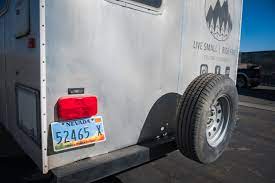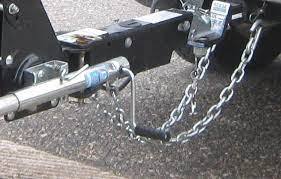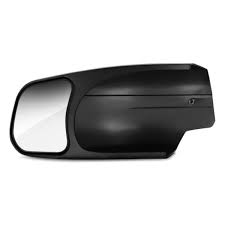Nevada Trailer Laws and Regulations
If you often find yourself towing heavy loads around your state you probably have some idea of the state laws and rules that apply to do this. Some people may not be aware however that sometimes laws can differ state by state. This can mean you might be legal in one state but crossing the border you might well get pulled over for an infringement you were not expecting.
In this article we are going to look at the laws for Nevada which may vary from the state you might be driving in from. There may also be regulations you were not aware of as a native to the state which might catch you out. So read on and let us try to keep you from costly tickets.
Do Trailers Need to Be Registered in Nevada?
Utility or travel trailers intended for the public roads in Nevada must be registered and have a title per state law. Trailers weighing less than 1,000 lbs. unloaded will receive a small license plate that will display the current registration information.

In order to obtain registration you will need some proof of ownership such as the title and for out of state trailers a VIN inspection is required as well. The DMV may also charge you out-of-state sales taxes as well as the registration fee for units purchased outside of Nevada.
Nevada General Towing Laws
These are general rules in Nevada regarding towing that you might come foul of if you were not aware of them. Sometimes you may get away with an infringement of these rules because you did not know them but you can not assume this will be the case.
There are no specific laws in Nevada regarding general towing however when this is the case then the basic rules of the road will apply. If it’s illegal in a car without a trailer in tow on the highway it likely would not be acceptable when towing.
Nevada Trailer Dimension Rules
It is important to know the state laws governing the sizes of loads and trailers. You may need permits for some loads while others may not be allowed on certain types of roads.
- You can not ride in or live in a trailer while it is being towed along public roads in the state.
- The total length of tow vehicle and trailer can not exceed 70 ft.
- The maximum length of the trailer is not specified.
- The maximum width for a trailer is 102 inches.
- The maximum height of a trailer and load is 14 ft.
Nevada Trailer Hitch and Signal Laws
There are laws in Nevada that relate to the trailer hitch and safety signals displayed by the trailer. It is important to be aware of these laws as they are safety based so may carry potentially large fines.

The state of Nevada requires that in addition to the primary hitch connection you must also use safety chains in case the first method of coupling fails.

Nevada Trailer Lighting Laws
When you are towing something that will obscure the rear lights of your tow vehicle it is important to be able to communicate your upcoming and present actions in the form of lights. This is why there are rules regarding trailer lighting.
- For pole trailers the only required lighting includes reflectors, stop lamps, turn signal lamps, and tail lamps at the back of the load.
- All trailers or semi trailers that are at least 80 inches wide must have 2 front clearance lamps (1 on each side), 2 rear clearance lamps, and 3 identification lamps. Additionally, each side of the vehicle must have 2 side marker lamps and 2 reflectors (1 at the front and 1 at the rear).
- Trailers that are 30 feet or longer, should have on each side 1 amber side marker lamp and 1 centrally located amber reflector.
- Pole trailers must have 1 amber side marker lamp and 1 amber reflector on each side near the front of the load.
- Lamps used for identification purposes should be placed in a horizontal row, with the centers of the lamps spaced between 6 and 12 inches apart. If possible ensure these lamps are mounted as close as possible to the vertical center line.
- Trailers that are designed to carry boats should typically have front and rear clearance lamps located on each side of the trailer at or near the midpoint between the front and rear of the trailer.
- All reflectors must be visible at night from 100 to 600 feet away.
- All front and rear clearance lamps and side marker lamps must be visible and clearly distinguishable from a distance of 50-500 feet.
Nevada Speed Limits
When it comes to speed limits this varies and depends on the posted speeds of the specific area. You obviously should not exceed the posted speed limit in any area. When it comes to normal towing there are no specific different limits but it is expected that the speed is kept at a sensible level.
If your trailer is being caused to sway or lose control due to speed you may be pulled over even if you are within the posted limits. This is because the trailer may be posing a threat to public safety and you will be asked to slow down.
Nevada Trailer Mirror Laws
The rules for mirrors in Nevada are not specified although they are likely required and you may be pulled over if you do not have any or they are unusable. If your view is compromised by the width of your load you may want to consider extensions to your existing mirrors. These can be in the form of mirror extenders that slot onto already existing wing mirrors.
- All trucks with a body that obscures the driver's view of the road behind them must be equipped with a mirror in such a position that will allow the driver to see any approaching traffic from the rear.
- All cars must have a mirror positioned in a way that allows the driver to see at least 200 feet behind them while
 .
.
Nevada Brake Laws
The brakes on your tow vehicle and potentially on your trailer are important to the safety of any towing operation. Ensure that they meet state guidelines and adhere to the stated rules for use on the road with a trailer.
- All trailers, semi trailers, or pole trailers built after July 1st, 1975 that weigh at least 1,500 lbs. must have service brakes on all wheels. Trailers built before July 1st, 1975, that weigh less than 3,000 lbs. aren't required to have brakes on all the wheels.
- All trailers that are equipped with air or vacuum brakes, and trailers that exceed 3,000 lbs. built after July 1st, 1969 need to have brakes on all wheels which are strong enough to remain applied for 15 minutes in the event that the trailer breaks away from the vehicle it is attached to.
- All trailers that weigh more than 3,000 lbs. must possess parking brakes that are adequate to keep the trailer stationary on any grade and in all weather conditions.
- Every vehicle that is towing another vehicle and that has air-controlled brakes needs two means for the emergency application of said brakes One of these braking methods should apply the brakes automatically if there's a reduction in towing vehicle air supply and the other should be a manually controlled device operable by the driver.
- All towing vehicles that tow other vehicles and have vacuum brakes shall have a secondary control device which they can use to operate the towed vehicle's brakes in an emergency.
- The secondary control must not rely on brake air, hydraulic, or any other pressure, and must be truly independent of any other controls.
Conclusion
There are a number of laws in Nevada that pertain to towing and trailers which are designed to keep the roads and road users safe. The state of Nevada has extensive lighting and brake rules when it comes to towing in the state so make sure you understand these regulations fully to avoid any legal issues.
Link To or Reference This Page
We spend a lot of time collecting, cleaning, merging, and formatting the data that is shown on the site to be as useful to you as possible.
If you found the data or information on this page useful in your research, please use the tool below to properly cite or reference Tow Ratings as the source. We appreciate your support!
-
<a href="http://towratings.net/blog/nevada-trailer-laws-and-regulations/">Nevada Trailer Laws and Regulations</a>
-
"Nevada Trailer Laws and Regulations". Tow Ratings. Accessed on April 25, 2024. http://towratings.net/blog/nevada-trailer-laws-and-regulations/.
-
"Nevada Trailer Laws and Regulations". Tow Ratings, http://towratings.net/blog/nevada-trailer-laws-and-regulations/. Accessed 25 April, 2024
-
Nevada Trailer Laws and Regulations. Tow Ratings. Retrieved from http://towratings.net/blog/nevada-trailer-laws-and-regulations/.